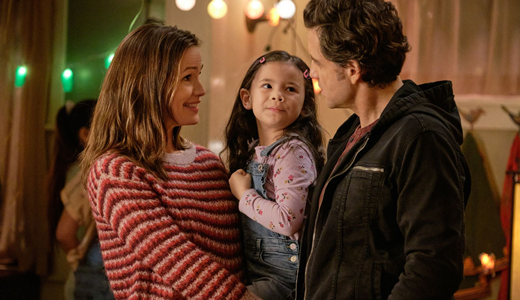In Netflix’s new film Yes Day, mom Allison Torres (Jennifer Garner) realizes she’s the parent who usually says “no” and sucks the fun right out of the air. Now she wants to change that with a whole 24 hours where she says yes to anything her children want—as long as it’s not crazy expensive (like an exotic trip), illegal or dangerous. But that doesn’t stop things from getting pretty out of hand. Be sure to check out our review before watching, but overall, Plugged In found it to be a pretty fun, family-friendly movie.
But how realistic is a “Yes Day?” Well, according to Garner, this is something that she and her kids actually practice one day a year. When her children were young, she read a book by Amy Krouse Rosenthal that sparked this idea that became a tradition. Then, of course, the film was made to showcase what it all might look like. Garner says none of their Yes Days have ever gotten as crazy as what we see in the film, which honestly helps me breathe a sigh of relief.
Here’s the thing: I’m usually the one that says “no” in our house. I think my husband is known by both our kids as the more “fun” parent. It’s not that I don’t enjoy having fun; I mean, I take my kids on more day trips than he does and more walks to the park. But I also like structure. It’s just part of my personality. And when fun includes having no structure, I tend to have a mini-panic attack, if only in my mind.
Let’s Try A ‘Yes Time‘
So, I’m here to propose something for parents like me. What if you started with a “yes time” once a year? After all, this is meant to be a once-a-year thing that kids can look forward to, like Christmas. Yeah, yeah, yeah. I know this is sort of the opposite point of the film. And I’m already making more free-spirited parents roll their eyes. But just hear me out.
Let’s say your kids are in the toddler stage, like one of mine, and an entire 24 hours of “yes” would mean epic meltdowns and tantrums after eating 100 packets of fruit snacks. That’s no bueno. It’s not good for you and it’s most certainly not good for the child whose day will inevitably be ruined.
But I can get down with a “yes time,” a time frame (let’s say two or three hours) where you clear your schedule and your calendar and you just say “absolutely” to whatever your littles are thinking (within reason). They want to eat ice cream for breakfast? YES. They want to play out in the snow and make snow cream with you when you would rather sit inside and read a book by the fire? YES. They want to run around the store when they would usually sit in the cart? YES.
You get the picture.
Because the point here isn’t to just say “yes” for the sake of the word. The point is to relax. It’s to have fun. It’s to realize that just as we need breaks and freedom and the space to do what we want sometimes, so do they. And as you set aside time to be intentional with the ones who have been entrusted to you, you can create fun traditions that will last.







4 Responses
-Maybe it’s because I’m not a parent, but I’m thinking that’s a really bad idea. You’re not supposed to be your kids’ pal, buddy, or friend. You’re supposed to be the one to set boundaries, to be the voice of control. I mean, to use your example, the kid wants ice cream for breakfast. That isn’t beneficial to the kid. I’m not against having fun with your kids, but like I said, you’re not supposed to be their friend.
Again, I’m not a parent, but I see no reason micromanagement shouldn’t be done. Plus, God is our example for parenthood, and He’s the ultimate in micromanagement. Everything in His plan is set right down to the smallest detail. So, why shouldn’t parents take on that level of control. Be the boss.
-I agree with you. God has control over everything, if He didn’t have control over the world, then we would be in trouble.
Plus, parents are supposed to guide their children throughout their lives. What choices you make when you are younger has a huge impact on your character in the present and future.
The biblical example of God and His only Son, Jesus Christ shows how Jesus came to fulfill God’s plan, not to fulfill any desire that man has.
I would not follow Netflix for parenting advice, they have so many issues morally that our family has not had a Netflix subscription for over a year.
This is an important topic, and I am afraid that Focus on the Family is poorly maintaining a biblical perspective. I love it when they refer to Scripture, even in their PluggedIn reviews! There was no thought of the Biblical factor in letting your kids do whatever they want to. This ironically causes issues for families.
I’m only going to use PluggedIn as a supplement unless they change their style.
I’m glad that God gave us His Perfect Plan of Salvation work out or I’d suffer the eternal punishment due to following what I think is fine.
-I don’t think she’s suggesting parents be like a pal or buddy to their kids. Two or three hours of giving your kids your time and doing something they think is fun…is there any harm in that?
I don’t think God is a micromanager. He has set the rules and promises to be with you. And you’re given the choice to follow. He knows your future because he knows you inside and out.
-I should clarify that I don’t completely agree with all of Nameless’s main points regarding God being just a “micromanager.” God has control over your whole life, including your salvation, as He is Sovereign.
This means that you can’t make the decision for whether or not you are saved, only God can save you. This is because we are dead in our sins without Christ, and a dead person can’t revive herself/himself.
Therefore, it’s important to show being sovereign–at a lower level–on the earth by having the father be the head of the household. Not the children.
And I’m not saying that you can’t have fun, but ensure that it’s healthy (not having ice cream for breakfast) and it’s moral (not doing anything that goes against Scripture).
I have heard that it’s more ideal to raise strong men and women rather than children.